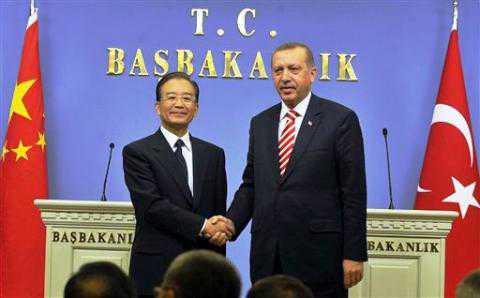Chinese Premier Wen Jiabao visited Turkey last week as part of his tour of Europe. Both countries – the fastest growing economies in the world – sealed agreements to cooperate in energy, transport and infrastructure.
Turkish Prime Minister Recep Tayyip Erdogan declared the visit an important step in the growing relationship between China and Turkey.
“We said let’s raise our trade volume to $50 billion by 2015. And as the second phase, by 2020 let’s aim to reach a volume of $100 billion. We have agreed upon this with my counterpart,” said Erdogan.
China Premier Wen Jiabao, described the transaction as a new “strategic partnership”, saying he recognized Turkey’s “power and influence in the international community and its region”.
Both countries – the fastest growing economies in the world – sealed agreements to cooperate in energy, transport and infrastructure.

One of the agreements would open the way for the joint construction of 4,500-kilometer railway in Turkey. Chinese companies are already involved in the construction of railroads for two high-speed train links. Turkey and China are also involved in projects to build oil pipelines from Iran.
Mr. Erdogan said the two countries have also agreed to carry out their trade in their national currencies.
Let’s continue our business transactions based on yuan and Turkish lira,” he said. “This would be the most important step after the similar steps we took with Russia and Iran.”
But analysts say trade may not be the only motive behind the Chinese premier’s visit.
Turkey’s ties with China have been strained at times, mostly over Beijing’s approach to unrest in Xinjiang, home to China’s Muslim Turkish minority Uighurs. Some analysts says China believes Turkey can play a role in helping to resolve tensions. Last year China was hit by major Uighur unrest which was violently put down by Chinese authorities.
That strained Turkish-Chinese relations with an angry diplomatic exchange. The Turkish prime minister accused China of committing atrocities, Beijing retorted telling Turkey to back down.
Political columnist Murat Yetkin says while trade is the backbone behind deepening relations, it seems to have moved into the diplomatic realm.
“Right before this visit, there was bilateral military exercise in Turkey where Chinese jets were involved in flying over Pakistani and Iranian airspace,” said Yetkin. “And, this was the first time ever, a Chinese air force had a military exercise with a NATO country. So Turkish-Chinese relations are getting more and more upfront.”
Businessman Omer Bollat, the former head of Musiad – a Turkish business confederation – says relations with China is part of a wider policy of reducing its dependancy on Europe.
“The Turkish economy with present government has been opening up to Eurasia markets, Russia Caucasus, Balkans, Middle Eastern gulf countries, African countries in particular North African countries,” said Bollat. “And the Turkish economy is diversifying its products, its services, and its markets not to be too much dependent on the European Union market.”
Turkish foreign policy adviser Gokhan Cetinsayar says while in the past previous Turkish leaders tried to develop ties with central Asia and China, those efforts failed due to a weak economy and unstable government. But, he says Turkey’s ruling AKP believes with the country’s strong economy and government such goals are obtainable.
“AKP’s foreign policy doctrine, Turkey with its strategic depth, geographic depth, Turkey with its economic and military power, should certainly play a leading role in the region including the Middle East,” said Cetinsayar. “Turkey should become a global power in the long run.”
The Turkey stop was part of the final leg of the Chinese premier’s four-nation European trip that started October 2, which also took him to Greece, Belgium, Germany and Italy.
Find this article at:

Leave a Reply